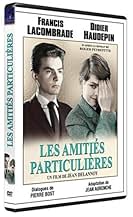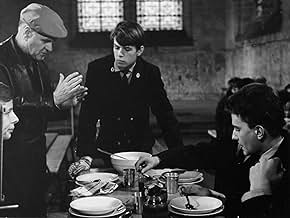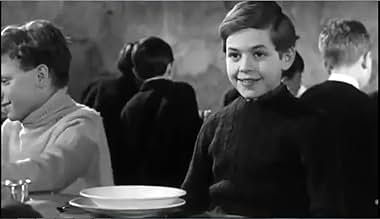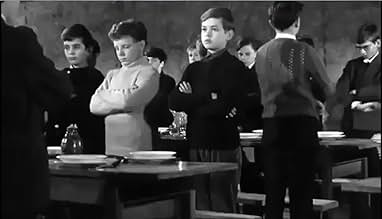IMDb रेटिंग
7.6/10
3.2 हज़ार
आपकी रेटिंग
अपनी भाषा में प्लॉट जोड़ेंA tale of the tender relationship between a 12-year-old boy and the upperclassman who is the object of his desire in the rigid atmosphere of their Jesuit-run school.A tale of the tender relationship between a 12-year-old boy and the upperclassman who is the object of his desire in the rigid atmosphere of their Jesuit-run school.A tale of the tender relationship between a 12-year-old boy and the upperclassman who is the object of his desire in the rigid atmosphere of their Jesuit-run school.
- निर्देशक
- लेखक
- स्टार
- पुरस्कार
- कुल 1 नामांकन
Gérard Chambre
- André Ferron
- (बिना क्रेडिट के)
Henri Coutet
- L'employé de l'institution
- (बिना क्रेडिट के)
Dominique Diamant
- Maurice Motier
- (बिना क्रेडिट के)
Alain-Philippe Malagnac
- Un élève
- (बिना क्रेडिट के)
Bernard Musson
- Le père enseignant
- (बिना क्रेडिट के)
Colette Régis
- La religieuse
- (बिना क्रेडिट के)
फ़ीचर्ड समीक्षाएं
Francis Lacombrade stars as the young Comte Georges de Sarre, student at a French boarding school run by the priests. Didier Haudepin is the even younger Alexandre, another student at the same school. It is post WWII France, and the school is run with heavy discipline.
Georges develops a special friendship with Alexandre, hence the title of the novel and the movie made from the novel. Roger Peyreffite is quite a famous French author, and this story is his best work.
The two boys develop their friendship in spite of the rules of the fathers who are dead set against this sort of thing happening at their school. Not that there is anything sensual about the relationship, just a few chaste kisses and poems with Georges describing Alexandre as his "bijoux".
There is a touching scene in the movie with the two boys hidden in a haystack lying besides each other, sharing the joy of their company and a stolen cigarette.
Not to give away the ending, but tragedy befalls the two boys.
Interesting to note that a friend of Peyreffite, who also worked as a French civil servant, Henri de Montherlant also wrote a novel about the love between two boys. The Boys is also set in a Catholic boarding school, but around the turn of the 19th century. And a similar tragic ending.
In both stories, the Church and its rules against too much affection between schoolboys plays a major role in the story as one of the antagonists. We are left wondering just how well both stories might have turned out if the boys had been left alone to share their friendships.
Georges develops a special friendship with Alexandre, hence the title of the novel and the movie made from the novel. Roger Peyreffite is quite a famous French author, and this story is his best work.
The two boys develop their friendship in spite of the rules of the fathers who are dead set against this sort of thing happening at their school. Not that there is anything sensual about the relationship, just a few chaste kisses and poems with Georges describing Alexandre as his "bijoux".
There is a touching scene in the movie with the two boys hidden in a haystack lying besides each other, sharing the joy of their company and a stolen cigarette.
Not to give away the ending, but tragedy befalls the two boys.
Interesting to note that a friend of Peyreffite, who also worked as a French civil servant, Henri de Montherlant also wrote a novel about the love between two boys. The Boys is also set in a Catholic boarding school, but around the turn of the 19th century. And a similar tragic ending.
In both stories, the Church and its rules against too much affection between schoolboys plays a major role in the story as one of the antagonists. We are left wondering just how well both stories might have turned out if the boys had been left alone to share their friendships.
I had read the novel (in English translation, one of two which have been published?) several years before seeing the film. It is, I think, characteristically French: carefully descriptive, observant, objective, restrained, but also subtly hypnotic. I read and read, and almost put the book down halfway through because it didn't seem to be going anywhere or making any impact on me. Then, all of a sudden, I was in tears-- but I still couldn't say exactly what had hit me other than everything. It was as though the pieces of a puzzle suddenly fell into place.
The film is faithful to the spirit as well as the letter of the book. Both were remarkably bold gestures for their time, describing an earlier generation and environment which were even more strait-laced. Like me, you may fall gently under its spell, then-- wham! Sheer magic.
The film is faithful to the spirit as well as the letter of the book. Both were remarkably bold gestures for their time, describing an earlier generation and environment which were even more strait-laced. Like me, you may fall gently under its spell, then-- wham! Sheer magic.
This Special Friendship was created in 1964 combining all the elements of a masterpiece. Born in the mind of Roger Peyrefitte, superbly adapted to the screen by Jean Delannoy, and exquisitely acted out by Francis LaCombrade and Didier Haudepin, this movie has become a timeless work of art. Set in France, in a religious Jesuit school, two boys, one sixteen, one twelve, intrigued by each other's company embark on a special friendship. This particular friendship which possesses all the unique qualities of genuine love and empathy is viewed as unholy by their priests who set about to destroy such a concept. The film is fashioned in black and white as were the rules of friendship in 1964. A classic, if ever there was one. Be prepared for some heart wrenching pathos. *****
Another Delannoy 's film which needs restoring to favor in its native France where the director's reputation,because of the stupidity of the fusty Cahiers du Cinema,has definitely sunk.Delannoy,almost a centenarian,worked till 1995 ,but "Les Amitiés Particulières" is his last good movie.I'm happy to notice that there's not one single negative comment on it.Proof positive that non-French are better at judging French Films.Maybe the rating is currently a bit too high (8,9),but if it can help Delannoy get out of oblivion where he has fallen,so much the better.
Delannoy ,transferring a novel which was very popular in the sixties,depicts a world which no longer exists.Lines warn us before the cast and credits:times have changed,iron discipline is now a thing of the past,but there are things which never change: the first emotions of the adolescence.
Some people wrote there was a "gay interest" in the movie.I do not think it is so.If Georges falls for Alexandre ,it is because he lives in a man's man's man's world.Except for the scene of the prize giving day,there are no women,a fortiori girls in the film.And this is a world where religion reigns everywhere,a world where young aristocrats or wealthy bourgeois study under the priests' extremely watchful eye.
Best performance comes from Didier Haudepin,a wunderkind (like Brigitte Fossey in "Jeux Interdits" ) who grew up to become a director ("Paco l'Infallible " starring the late Patrick Dewaere) and an actor ("Les Assassins de l'Ordre" one of Marcel Carné's last efforts) but without any real success.When he appears ,holding the lamb,it is a transparent metaphor of purity.Alexandre's and Georges's love will remain pure and platonic .Their relationship reminds me of that between Le Petit Prince and the aviator in Saint-Exupery's famous novel.Their meetings in the greenhouse are extremely well filmed .That was not such an easy subject for the sixties and the pejorative word "academic" with which the highbrows often label Delannoy does not make any sense here.
Delannoy ,transferring a novel which was very popular in the sixties,depicts a world which no longer exists.Lines warn us before the cast and credits:times have changed,iron discipline is now a thing of the past,but there are things which never change: the first emotions of the adolescence.
Some people wrote there was a "gay interest" in the movie.I do not think it is so.If Georges falls for Alexandre ,it is because he lives in a man's man's man's world.Except for the scene of the prize giving day,there are no women,a fortiori girls in the film.And this is a world where religion reigns everywhere,a world where young aristocrats or wealthy bourgeois study under the priests' extremely watchful eye.
Best performance comes from Didier Haudepin,a wunderkind (like Brigitte Fossey in "Jeux Interdits" ) who grew up to become a director ("Paco l'Infallible " starring the late Patrick Dewaere) and an actor ("Les Assassins de l'Ordre" one of Marcel Carné's last efforts) but without any real success.When he appears ,holding the lamb,it is a transparent metaphor of purity.Alexandre's and Georges's love will remain pure and platonic .Their relationship reminds me of that between Le Petit Prince and the aviator in Saint-Exupery's famous novel.Their meetings in the greenhouse are extremely well filmed .That was not such an easy subject for the sixties and the pejorative word "academic" with which the highbrows often label Delannoy does not make any sense here.
10hadock4
People who have loved the novel by Roger Peyrefitte should equally love the film by Delannoy. This story of a thwarted love between two young boys in a french Catholic college in the 50's, faithfully transcribes the nearly oppressive atmosphere which prevailed in religious boarding schools in those days. The climate of repressed, contained passion at times culminates in sublimated eroticism as when Georges kisses the medal worn by Alexandre against his breast. The film perfectly renders the perversity of some priests who secretly encourage the forbidden love, sharing it by proxy, while openly condemning it. A remake of this film could not possibly be made nowadays. It tells a story of a time when,as the great Burke wrote, though at a far anterior period, "vice itself lost half its evil by losing all its grossness". The cast is excellent and the Black & White pictures superb.
क्या आपको पता है
- ट्रिवियाIn the source novel, Georges de Sarre is 14 years old and Alexandre Motier is 12 years old. However, the year in which the film was made, Francis Lacombrade (1942-) was 22 years old and Didier Haudepin (1951-) was 13 years old.
- गूफ़When Lucien looks at his watch we can see that the time is 6:15 but he reads it as 10:35.
टॉप पसंद
रेटिंग देने के लिए साइन-इन करें और वैयक्तिकृत सुझावों के लिए वॉचलिस्ट करें
- How long is This Special Friendship?Alexa द्वारा संचालित
विवरण
- रिलीज़ की तारीख़
- कंट्री ऑफ़ ओरिजिन
- भाषा
- इस रूप में भी जाना जाता है
- This Special Friendship
- फ़िल्माने की जगहें
- Abbaye de Royaumont, Asnières-sur-Oise, Val d'Oise, फ़्रांस(jesuit college where the story takes place)
- उत्पादन कंपनियां
- IMDbPro पर और कंपनी क्रेडिट देखें
- चलने की अवधि
- 1 घं 40 मि(100 min)
- रंग
- ध्वनि मिश्रण
- पक्ष अनुपात
- 1.78 : 1
इस पेज में योगदान दें
किसी बदलाव का सुझाव दें या अनुपलब्ध कॉन्टेंट जोड़ें









